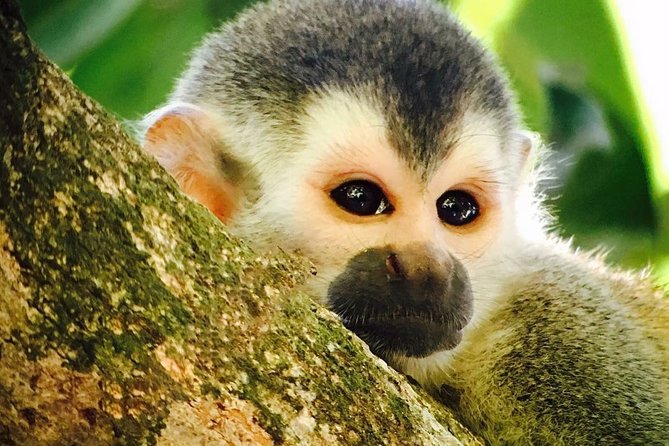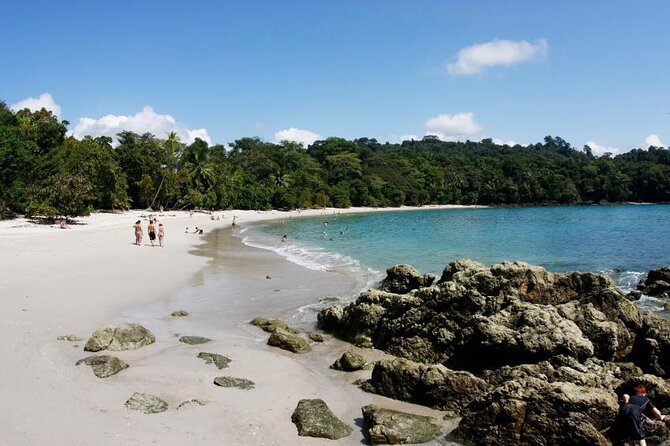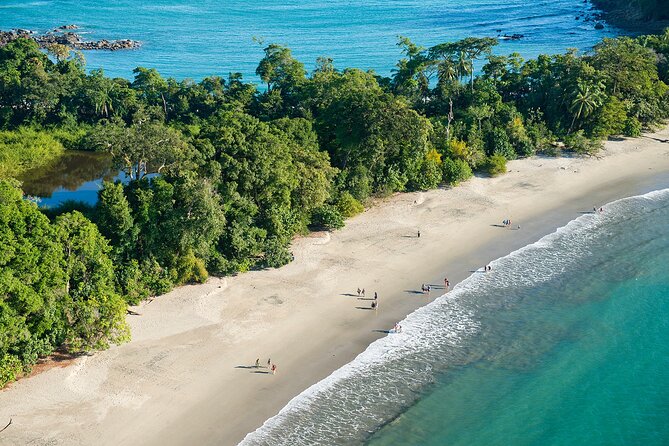Nestled within Manuel Antonio National Park lies a world teeming with life, where the symphony of nature plays out in every corner. As the sun filters through the dense canopy, a vibrant tapestry of wildlife unfolds before visitors’ eyes.
From the mysterious depths of the rainforest to the azure waters of the Pacific Ocean, the park is a sanctuary for a diverse array of creatures. Each turn of the trail unveils a new chapter in the story of this ecological wonder.
Prepare to be captivated by the untold secrets that await, drawing you deeper into the heart of this natural paradise.
- Good To Know
- Biodiversity in Manuel Antonio National Park
- Mammals Found in the Park
- Bird Species to Spot
- Reptiles and Amphibians in the Area
- Marine Life Off the Coast
- Insects and Arachnids in the Ecosystem
- Endangered Species Protection Efforts
- Wildlife Conservation Programs
- Common Questions
- Are There Any Specific Spots Within Manuel Antonio National Park That Are Known for Frequent Wildlife Sightings?
- What Is the Best Time of Day to Visit the Park for Optimal Wildlife Viewing Opportunities?
- Are There Any Guided Tours Available Within the Park That Focus Specifically on Wildlife Observation?
- How Close Can Visitors Get to the Wildlife Within the Park and What Safety Precautions Should Be Taken?
- Are There Any Unique or Rare Species of Wildlife That Can Only Be Found in Manuel Antonio National Park?
- The Sum Up
- More Wildlife Tours in Quepos
- More Tour Reviews in Quepos
- Looking for something different? Other Quepos activities we've written about
Good To Know

- Teeming wildlife diversity and endangered habitats coexist.
- Jaguars, sloths, and colorful birds thrive in diverse ecosystems.
- Red-eyed Tree Frog, Green Iguana, and other unique herpetofauna.
- Vibrant marine life with diving opportunities off the coast.
Biodiversity in Manuel Antonio National Park

Teeming with a remarkable array of wildlife, Manuel Antonio National Park showcases an unparalleled biodiversity that captivates visitors from around the globe.
The park’s diverse ecosystems, ranging from mangrove swamps to pristine beaches, provide habitats for a wide variety of plant and animal species.
However, these endangered habitats face threats from deforestation and unsustainable development, emphasizing the importance of conservation efforts.
The park’s popularity among travelers has led to a significant ecotourism impact, promoting awareness of the delicate balance between human activities and the preservation of natural environments.
More tours and activities we've covered in Quepos
Mammals Found in the Park

The biodiversity of Manuel Antonio National Park extends beyond its plant and animal species to include a diverse array of mammals that play a vital role in the park’s ecosystem. The park’s habitat diversity provides a rich environment for various mammal species to thrive, contributing to the overall balance of the ecosystem. Conservation initiatives within the park aim to protect these mammals and their habitats, ensuring their continued presence for future generations to enjoy.
Jaguars, sloths, and white-faced capuchin monkeys are some of the mammals commonly spotted in the park.
Explore the park’s trails to catch a glimpse of these fascinating creatures in their natural habitat, observing their behaviors and interactions within this unique ecosystem.
Bird Species to Spot
With over 180 species documented, visitors to Manuel Antonio National Park can expect a vibrant avian spectacle during their exploration. Bird watching enthusiasts will delight in the diverse range of feathered inhabitants that call this park home.
From the resplendent scarlet macaws to the tiny but colorful tanagers, the park offers a rich tapestry of avian diversity. The melodious songs of the various species fill the air, creating a symphony of natural sounds that enhance the overall experience.
Whether soaring overhead or flitting among the trees, the birds in Manuel Antonio National Park provide endless opportunities for observation and appreciation. For those interested in birdlife, this park is a true paradise that promises an unforgettable encounter with Costa Rica’s winged wonders.
Reptiles and Amphibians in the Area
Amidst the lush greenery of Manuel Antonio National Park, a diverse array of reptiles and amphibians quietly inhabit the vibrant ecosystem. Visitors keen on herpetofauna observation will delight in spotting these fascinating creatures with unique habitat preferences.
Here are some highlights to look out for:
Red-eyed Tree Frog: Known for its vibrant colors and large red eyes, this amphibian thrives in the park’s humid rainforest areas.
Green Iguana: These impressive reptiles are often seen basking in the sun on tree branches or rocks, displaying their striking green scales.
Fer-de-Lance Snake: A venomous pit viper found in the park’s dense vegetation, showcasing the importance of respecting wildlife boundaries during exploration.
Exploring these creatures in their natural habitat offers a glimpse into the intricate balance of the park’s ecosystem.
Marine Life Off the Coast
Visitors exploring the lush greenery of Manuel Antonio National Park can now turn their attention towards the captivating marine life just off the vibrant coast. The waters surrounding the park are teeming with a diverse array of marine species, making it a prime location for ocean exploration. One of the most spectacular sights is the vibrant coral reef ecosystem that supports a stack of marine organisms. The coral reefs off the coast are a haven for colorful fish, sea turtles, and other fascinating creatures. Diving or snorkeling in these waters offers an up-close encounter with this underwater world.
| Marine Life Highlights | Description |
|---|---|
| Coral Reef | Vibrant ecosystem supporting diverse marine species |
| Ocean Exploration | Opportunity for diving and snorkeling adventures |
- Waterfalls Eco Adventure Manuel Antonio by Mulguri
- White Water Rafting Manuel Antonio Quepos Savegre River
- White Water Rafting Upper Naranjo River (Chorro Section, Dec. 15th – May 15th)
- Manuel Antonio Jungle Night Tour With Pick up Included
- Puntarenas Rafting Tour – Quepos
- Manuel Antonio Park Private Nature Guided Tour Experience
Insects and Arachnids in the Ecosystem
In the vibrant ecosystem of Manuel Antonio National Park, an array of fascinating insects and arachnids play essential roles in maintaining the delicate balance of the ecosystem.
Insect Identification: Visitors can observe a variety of colorful butterflies, beetles, and ants, each contributing uniquely to the park’s biodiversity.
Arachnid Behavior: Witness the intricate web-building techniques of spiders and the stealthy hunting strategies of scorpions and harvestmen.
Ecosystem Interactions: Explore how these insects and arachnids interact with other species, from pollinating plants to serving as prey for larger animals.
These small but crucial creatures add to the richness of the park’s wildlife, offering insights into the intricate web of life within Manuel Antonio National Park.
Endangered Species Protection Efforts
Efforts to protect endangered species within Manuel Antonio National Park are a cornerstone of the conservation initiatives aimed at preserving the park’s biodiversity. Endangered species research plays a crucial role in understanding the population dynamics and habitat requirements of these vulnerable species. Through such research, conservationists can better tailor habitat preservation efforts to suit the specific needs of these animals, ensuring their survival within the park.
Habitat preservation efforts involve maintaining and restoring critical habitats, such as nesting sites or feeding grounds, to provide a safe environment for endangered species to thrive. By combining research and habitat preservation, Manuel Antonio National Park continues to actively safeguard its endangered species and contribute to global conservation efforts.
Wildlife Conservation Programs
Continuing the commitment to biodiversity preservation, Manuel Antonio National Park implements various wildlife conservation programs to ensure the long-term protection of its diverse animal species. These programs include:
Wildlife monitoring: Through regular surveillance and data collection, the park can track population trends, behaviors, and health indicators of different animal species.
Habitat restoration: Efforts are made to restore and preserve natural habitats within the park to provide a suitable environment for wildlife to thrive.
Community engagement: Involving local communities in conservation efforts fosters a sense of responsibility and stewardship towards the park’s wildlife and habitats.
Common Questions
Are There Any Specific Spots Within Manuel Antonio National Park That Are Known for Frequent Wildlife Sightings?
Visitors enjoy prime locations for wildlife sightings in Manuel Antonio National Park, ideal for wildlife photography, bird watching, and jungle treks. The park’s diverse ecosystem offers abundant opportunities for spotting various species amidst lush surroundings.
What Is the Best Time of Day to Visit the Park for Optimal Wildlife Viewing Opportunities?
For the best wildlife viewing opportunities, early morning and late afternoon are ideal times to visit. Animals are often more active during these periods. Nighttime and midday visits may offer different experiences due to varying animal behaviors and visibility.
Are There Any Guided Tours Available Within the Park That Focus Specifically on Wildlife Observation?
Night tours and bird watching excursions are available within the park, offering immersive wildlife observation experiences. These guided tours provide unique opportunities to witness nocturnal creatures and diverse bird species in their natural habitat, enhancing visitors’ understanding of the park’s rich biodiversity.
How Close Can Visitors Get to the Wildlife Within the Park and What Safety Precautions Should Be Taken?
Visitors can view wildlife from a safe distance in the park. Proximity boundaries must be respected to ensure both visitor safety and animal well-being. Following wildlife interaction guidelines promotes a memorable experience while safeguarding the ecosystem.
Are There Any Unique or Rare Species of Wildlife That Can Only Be Found in Manuel Antonio National Park?
In Manuel Antonio National Park, visitors can encounter unique endangered species due to its biodiversity hotspots. Conservation efforts support ecotourism opportunities. The park’s commitment to protecting rare wildlife makes it a haven for nature enthusiasts.
The Sum Up
Set out on a journey through the enchanting realms of Manuel Antonio National Park, where lush rainforests meet pristine beaches, offering a haven for a myriad of wildlife species. From vibrant toucans to elusive sloths, the park is a treasure trove for wildlife lovers.
With ongoing conservation efforts and protection programs, visitors can witness the beauty of nature while contributing to the preservation of these precious ecosystems.
Explore, discover, and learn about the full wildlife experience of Manuel Antonio National Park.
More Wildlife Tours in Quepos
- Private Urban Wildlife City Tour From Manuel Antonio to Quepos
- Wildlife Extravaganza: Manuel Antonio Land & Sea Tour
- Los Campesinos Reserve, Waterfalls and Wildlife: Small-Group – Quepos
- Manuel Antonio National Park Afternoon Wildlife Experience
- Manuel Antonio National Park Wildlife Tour
- Manuel Antonio Park Tour and Its Amazing Wildlife and Beaches
More Tour Reviews in Quepos
- Private Jungle Hike to 2 Waterfalls With Lunch
- Private Transport Manuel Antonio to Arenal
- Transfer Manuel Antonio Hotels to Airport Area Private One Way
- Shared Shuttle From Manuel Antonio to Monteverde
- Birdwatching Tour Manuel Antonio /Esquipulas Group Tour Experience
- Private Manuel Antonio National Park
Looking for something different? Other Quepos activities we've written about
- 24 Best Guided Tours In Quepos
- 22 Best Workshops And Classes In Quepos
- 25 Best Tours In Quepos
- 8 Best Snorkeling Experiences In Quepos
- 5 Best Full-Day Tours In Quepos
- 2 Best Shopping Tours In Quepos
- 22 Best Boat Tours And Cruises In Quepos
- 20 Best Private Driver Services In Quepos
- 7 Best Airport Transfers In Quepos
- 18 Best Guided Tours In Quepos
- 4 Best 3 Hour Tours and Experiences in Quepos
- 4 Best 2 Hour Tours and Experiences in Quepos
